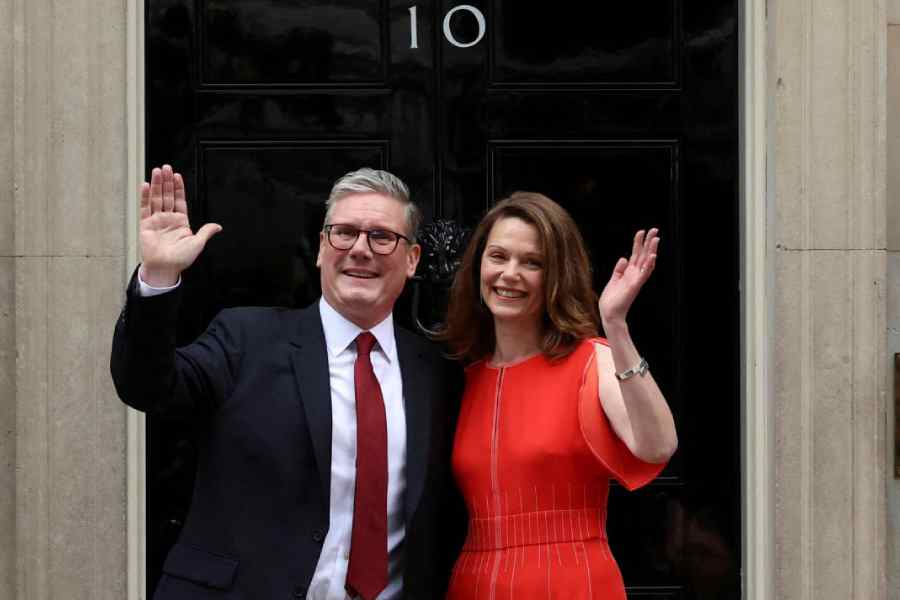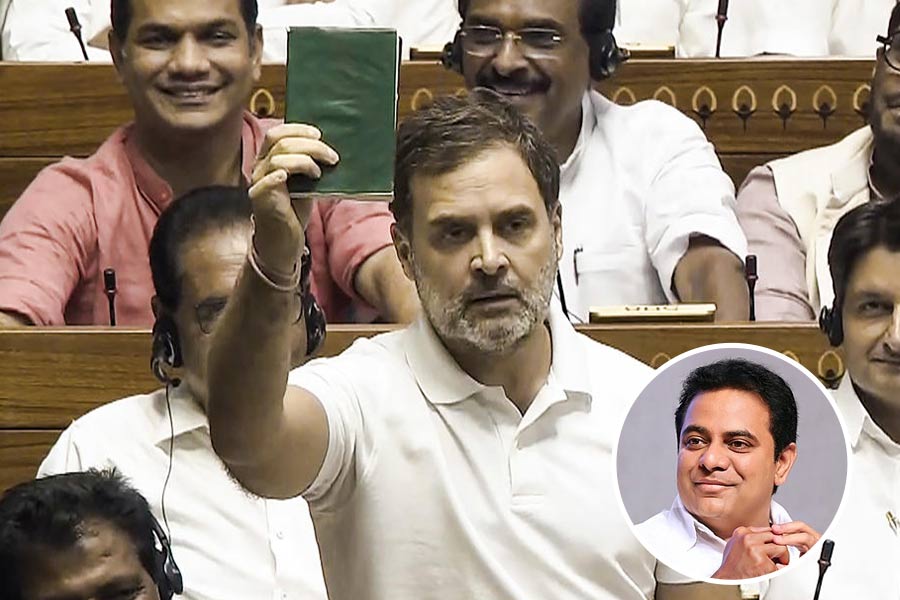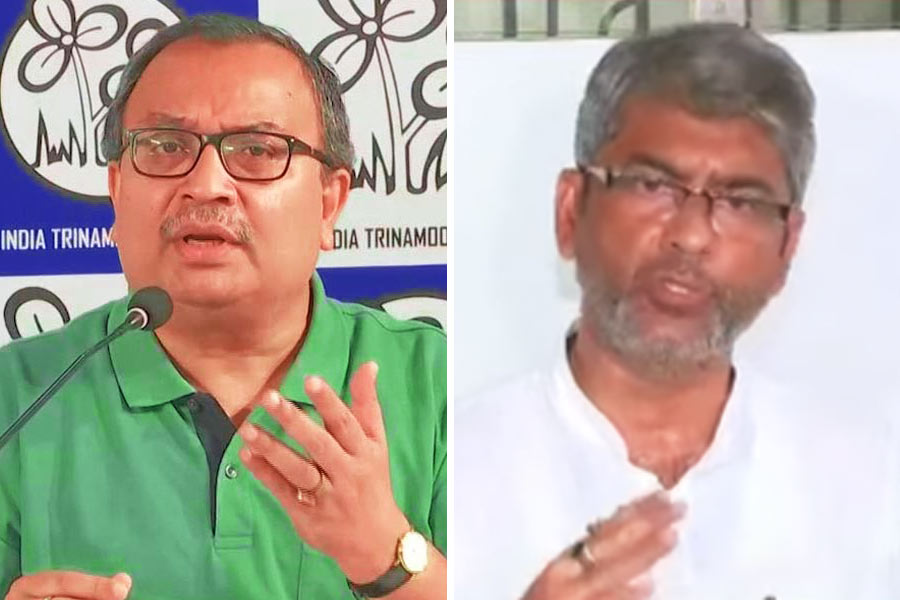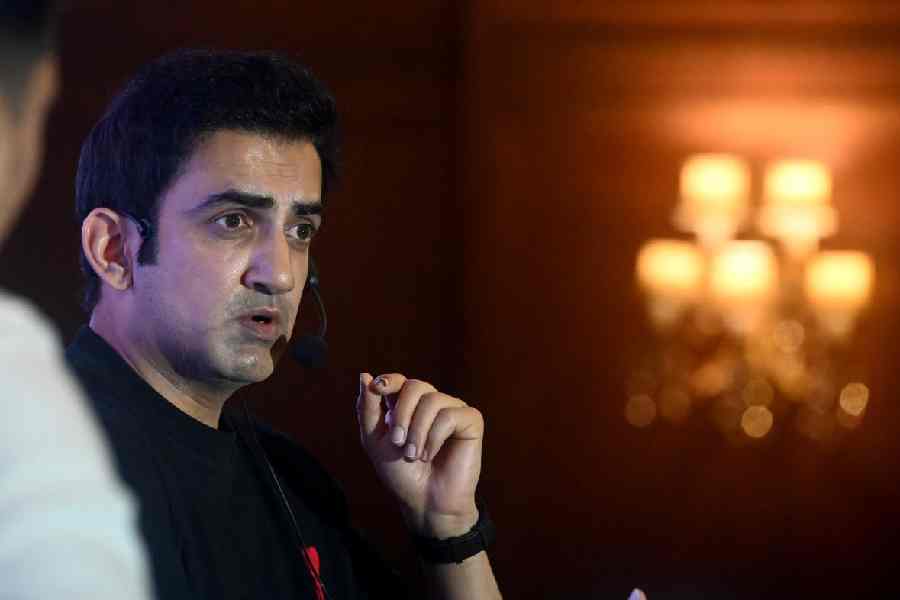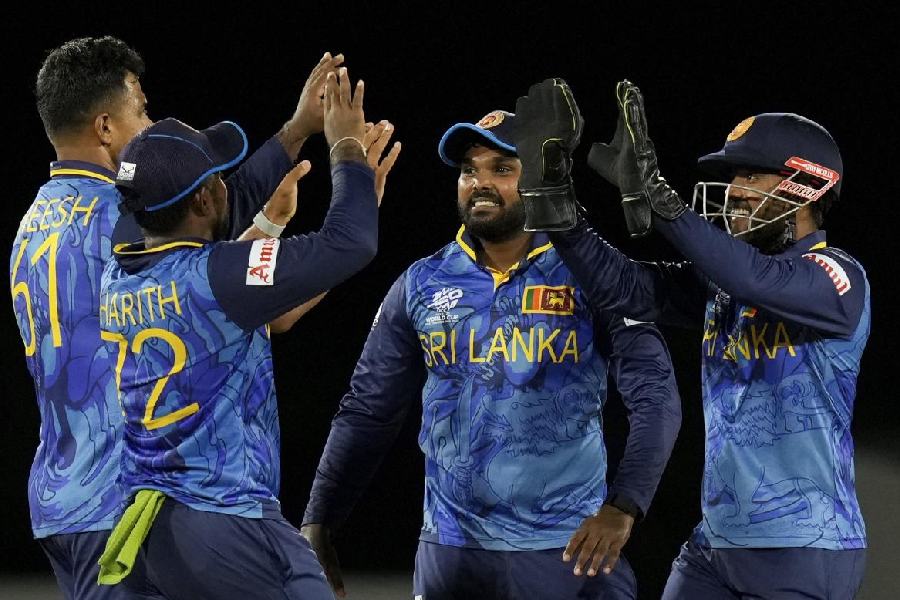The Labour Party on Friday crossed the 400-seat barrier and romped to a landslide majority of 170 in the British general election, with its leader Keir Starmer promising a “reset” and a “country first, party second” ethic.
Rishi Sunak, the UK’s first Indian-origin Prime Minister, who has taken the Tories to their worst defeat in history — down 250 seats to 121 in a House of 650 — bowed out with grace and dignity.
Unlike the exit poll fiasco in India last month, British pollsters had hit the bull’s eye, predicting more than 400 seats for Labour.
Making his last speech as Prime Minister outside the doors of 10 Downing Street, with the forlorn figure of his wife Akshata Murty in the background, Rishi said: “One of the most remarkable things about Britain is just how unremarkable it is that two generations after my grandparents came here with little, I could become Prime Minister. And that I could watch my two young daughters light Diwali candles on the steps in Downing Street.”
It was just starting to drizzle as he went on: “We must hold true to that idea of who we are. That vision of kindness, decency and tolerance that has always been the British way. This is a difficult day at the end of a number of difficult days. But I leave this job honoured to have been your Prime Minister.”
Labour got 412 seats, up 211, but the party “didn’t so much as win the election as the Tories lost it”, analysts commented. The Labour share on a low turnout of only 60 per cent went up fractionally to 35 per cent from 32.1 per cent in 2019. But the Tories plummeted from 43.6 per cent in 2019 to 23.7 per cent.
The Liberal Democratic vote went up from 11.5 per cent to 12.2 per cent but the party ended up with 71 seats, up 63 from 2019.
The real damage to the Conservatives was caused by Nigel Farage’s Reform UK, made up mostly of Tory defectors or people from the far Right, one of whose campaigners had abused Rishi with a four-letter expletive and the word “Paki”.
Reform got four MPs, including Farage in his eighth attempt to get into Parliament, but it received 14.3 per cent of the popular vote. It significantly came second in 89 seats, preventing the Tories from winning.
During what has been described as a “bloodbath”, 10 cabinet ministers lost their seats. Among those ousted were defence secretary Grant Shapps and leader of the House of Commons Penny Mordaunt, who were candidates to succeed Rishi as the next Tory leader.
Rishi himself was re-elected with a comfortable majority in Richmond and Northallerton.
At 4.39am, he conceded defeat, saying he had telephoned Starmer to offer his congratulations. He confirmed he would stay on as an MP, dismissing rumours from Tory enemies that he would flee to sunny California.
He apologised for his party’s defeat: “There is much to learn and reflect on and I take responsibility for the loss.”
He repeated the apology in his final speech outside Downing Street, just before leaving with Akshata for Buckingham Palace to offer his resignation to King Charles.
“To the country, I would like to say first and foremost, I am sorry,” he said.
He said he would step down as party leader — “not immediately, but once the formal arrangements for selecting my successor are in place”.
Although he and Starmer had exchanged harsh words during the campaign, commentators noted that Rishi was gracious in defeat: “Whatever our disagreements in this campaign, he is a decent, public-spirited man who I respect.”
History will probably recognise that in 20 months, Rishi did stabilise the economy after Liz Truss’s disastrous 45 days as Prime Minister — she, incidentally, lost her seat — and brought inflation down from 11 per cent to 2 per cent.
Rishi cited the negotiation of the Windsor Framework with the EU and the efforts to support Ukraine during his premiership.
“I’m proud of those achievements. I believe this country is safer, stronger and more secure than it was 20 months ago,” he said.
Prime Minister Narendra Modi thanked Rishi “for your admirable leadership of the UK, and your active contribution to deepen the ties between India and the UK during your term in office”.
Modi offered his “heartiest congratulations and best wishes” to Starmer on his “remarkable victory” and said he looked forward “to our positive and constructive collaboration to further strengthen the India-UK Comprehensive Strategic Partnership in all areas, fostering mutual growth and prosperity”.
Starmer followed Rishi in meeting the King.
To his supporters, the incoming Prime Minister said: “We did it. It feels good, I have to be honest. Four and a half years of changing the party — this is what it is for.”
In his speech outside No 10, Starmer said he wanted to thank Rishi, adding that his achievement as the first British Asian PM of this country — “the extra effort that that will have required” — should not be “underestimated by anyone”.
He said: “Whether you voted Labour or not — in fact, especially if you did not — I say to you directly, my government will serve you. Politics can be a force for good. We will show that. We have changed the Labour Party, returned it to service — that is how we will govern.”
On relations with the Modi government, Starmer may not be able to control elements in his party — and not all of them will be Pakistani-origin MPs — that are prepared to call out what they regard as the BJP’s rights abuses in India.
Starmer, who has taken a notably pro-Israeli line, angered Muslim voters in several constituencies.
In Islington North in London, Jeremy Corbyn, the former Labour leader and a Starmer critic, won as an Independent with a handsome majority, defeating the official Labour candidate, the Indian Praful Nargund.
In the new Commons, a fresh face will be that of the Indian Shivani Raja, who registered the only Conservative gain of the night.
In Leicester East, she got 14,526 votes while another Indian, Labour’s Rajesh Agrawal, received 10,100.
The constituency’s long-time Labour MP, Keith Vaz, standing as an Independent, attracted a disappointing 3,611 votes despite being endorsed by the Bollywood actress Shilpa Shetty.
The battle is now on to save “the soul of the Conservative party”.
Some on the far Right — encouraged by trends in France and elsewhere in Europe — will seek a merger with Farage’s Reform UK and move the Tories to extreme anti-immigrant nationalism.
Reform’s vote share is regarded by some analysts as being as important a development as Labour’s victory.
A journalist — and it was a serious question — asked Farage: “Do you want to be leader of the Conservative party?”
Farage, who won in Clacton and was congratulated by his hero Donald Trump on his “big WIN”, warned: “We’re coming for Labour — be in no doubt about that. This is the first steps in something which is going to stun all of you.”
With several likely candidates knocked out, it remains to be seen whether the Goan-origin former home secretary, Suella Braverman, blamed by many for helping bring Rishi down, will contest the Tory leadership.

